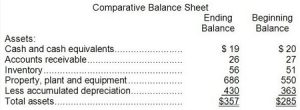
Look for software that offers the features you need, and check for integrations with other software you use. The cost of non cloud accounting software varies depending on the software you choose. Some non cloud accounting software options may be more expensive than cloud-based software, while others may be more affordable. The advantages of using non cloud accounting software include increased control and security over your financial data.
- Not everyone enjoys tackling their bookkeeping and accountancy duties, so if you’re running a small business and fall into that category, then ZipBooks is worthy of investigation.
- Enterprise accounting software provides support for all tax management processes within an enterprise.
- Use Xero to work with your employees, bookkeeper, or accountant online, even if you’re on opposite sides of the world.
- Among its many useful features are the ability to receive payments, send invoices, record time worked, capture expense receipts, and view reports from your mobile app.
Best Non-Cloud Based Accounting Software for Your Business [2024 Update]
Zoho Books allows you to track your customers, and excellent integration with e-commerce apps makes the application a great fit for those selling products online. For those selling services, you can track your time on any project and bill your customers for time spent automatically. Reports are available in a variety of categories, with all reports easily customizable.
Third-party Reviews
Acumatica Cloud ERP’s corporate accounting software offers a wide range of financial management and accounting features for enterprises, including multi-entity enterprises. Using Acumatica Cloud ERP, enterprises can centralize their financial data https://www.online-accounting.net/ and processes across offices and subsidiaries. In addition to these core accounting tools, Sage Intacct offers advanced tools such as dynamic allocations, AI-powered timesheets, project-based accounting, and even time and expense management.

Kashoo: Easiest setup

While, with most accounting software, you must generate a new report after choosing from a list of reports, the reports list in Zoho Books already has all data populated in each report. Users importance of monthly balance sheet reconciliation give Zoho Books a 4.4 out of five-star rating on Capterra and 618 reviews. Users say the features are intuitive to use, though the system as a whole comes with a slight learning curve.
Billing and invoicing
Through SAP Billing and Revenue Innovation Management, enterprises can automate their billing and invoicing processes. And through SAP S/4HANA Cloud, companies can improve the accuracy of their financial closing processes. Xero is a powerful online accounting software solution https://www.business-accounting.net/two-types-of-business-accounting-methods/ for small businesses. Run things smoothly, keep tidy online bookkeeping records, and make compliance a breeze. While upgrading traditional accounting software is expensive, difficult, and time-consuming, cloud accounting software requires nothing you need to install or update.
By clicking “more actions,” then “generate invoice” from the top of the page, I could also easily bill a client. Once I had completed the action, I could click the X on the action item to remove it from the to-do list. I signed up for a free trial of FreshBooks’ accounting software and tested it on a Mac laptop using the Safari browser. All action items were clearly labeled and I was walked through how to complete all tasks. The biggest advantages to using QuickBooks are ease of use, seamless integrations and ubiquity.
The basic plan is free and lets you send unlimited invoices, manage unlimited vendors and customers, and check basic reports and supporting connections to one bank. In the UK, Freshbooks has collaborated with Barclays to provide joint bookkeeping solutions for customers, offering new ways to help with invoicing and wider business management tasks. We hope this article has provided some insight into the top non-cloud accounting software out there so that you can find one that best fits your small business’s needs. This list was highly customizable, a theme I would experience while testing different features on the platform. For example, I could immediately use the search bar across the top of the screen to search my documents by keyword. And when I clicked “filter” at the top of the screen, a drop-down menu appeared that allowed me to filter the documents stored by date added, source, folder, keyword search, category or date.
Additionally, it offers a range of reports that help you make informed decisions. MYOB also offers a user-friendly interface, making it easy to use for businesses of all sizes. FreshBooks Accounting offers a 30-day free trial, after which you can choose from four pricing plans. The Lite plan starts at $15 per month and offers basic features like invoicing and expense tracking. The Plus plan costs $25 per month and adds features like time tracking and project management. The Premium plan is priced at $50 per month and offers advanced features such as client retainers and double-entry accounting.
In our assessment, Invoicera excelled in invoicing features and customization. For businesses with intricate billing workflows, it provides the flexibility to establish personalized invoice approval processes. This enables efficient review, authorization, and approval of invoices by team members before being finalized and sent to clients or customers for payment. We selected Invoicera as the best standalone invoicing software as an alternative to QuickBooks because its features can be customized to the needs of your business. It offers a comprehensive set of invoicing features that allow you to create custom invoices, automate recurring billing, manage expenses, and handle multiple currencies.

FreshBooks was built with the freelancer in mind with its single-user access. You can add more users to your account, but it costs $10 per user, per month, at which point FreshBooks loses considerable value. QuickBooks dominates the market for small business accounting—but it isn’t always the best answer, and there are many alternatives to QuickBooks to consider. Depending on your budget, required features, and industry, you might find an option that will meet your needs better. Along with subjective evaluation by our accounting experts, the ease-of-use score indicates whether the software is cloud-based. Other components include whether it requires a third-party bookkeeping software integration.
To compare, QuickBooks Online’s highest plan is $200 per month for up to 25 users, whereas Xero’s highest plan is only $78 per month for unlimited users. If your business doesn’t need QuickBooks Online Advanced but wants more users, we recommend choosing Xero because it is more affordable and has no user limit. You can also track using classes and locations as well as record fixed assets with QuickBooks Online.
This software is cloud-based and can be accessed from any device with an internet connection. But with so many options available, it can be hard to know which one to choose. More advanced plans may include such perks as automatic notifications and fees for being late. Moreover, these strategies may include a retainer component that bills hours worked over and above the original retainer fee.
It includes features, such as bank account tracking, expense tracking, financial calculations and reports. While it doesn’t have as many extras with its small business features, it makes up for it in flexibility, with the ability to track stocks, commodities and other investments. Accounting software is a great way to manage your finances if you’re a small business owner, freelancer or contract worker. These solutions typically include features, such as invoicing, expense tracking and financial reports.
Once you’ve sent your invoice, you can then track invoices to ensure they’re paid, run reports that show the age of each outstanding invoice and apply invoice payments to specified transactions. QuickBooks is an easy-to-learn program, which is one of the reasons why it’s such a popular choice. Aside from it being an intuitive accounting software, it also includes a vast help center full of tutorials, frequently asked questions (FAQs) and webinars to help you master the program. QuickBooks is an excellent option for accounting and invoicing software but there are viable alternatives that may fit your business better. For example, if you’re looking to save money on payment processing, QuickBooks Payments might not be right for you and you may want to choose Xero, which lets you choose your own payment processor.